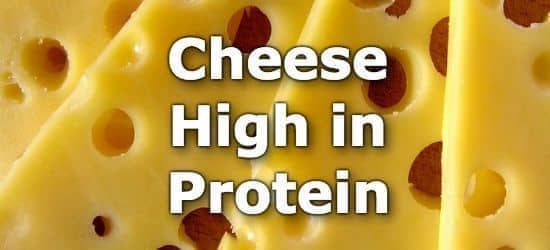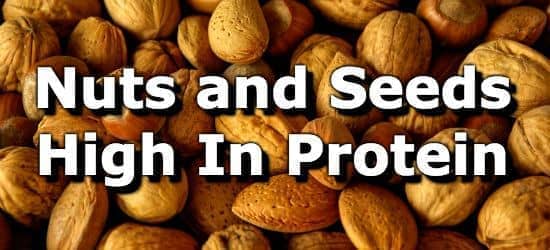20 Cheeses High in Protein

For vegetarians or anyone simply looking to get more protein into their diet, cheese can be a good choice, but which are the healthiest choices?
Here is a list of 20 different kinds of cheese that provide the most protein per ounce (oz) or half cup. An ounce of cheese is approximately equal to a thin slice large enough to cover a piece of toast.
The current daily value (DV) for protein is 50 grams per day. (1) Cheeses high in protein include ricotta, low-fat cottage cheese, Parmesan, Romano, non-fat cheddar, gruyere, low-fat Swiss, fontina, and more.
Many of the cheeses on this list are low-fat or non-fat cheeses. In general, cheeses which are lower in fat will tend to contain more protein per serving. However, this is not always the case, and some of the cheeses on the list have a higher fat content.
For more high protein foods, see the articles on vegetarian protein foods, beans high in protein, grains high in protein, and nuts high in protein.
List of High Protein Cheese
| Food | Serving | Protein |
|---|---|---|
| #1 Low Fat Cottage Cheese + | per 1/2 cup | 24% DV 11.8g |
| #2 Grated Parmesan + | per oz | 20% DV 10.2g |
| #3 Ricotta + | per 1/2 cup | 19% DV 9.3g |
| #4 Romano + | per oz | 18% DV 9g |
| #5 Non-Fat Cheddar + | per oz | 18% DV 9g |
| #6 Hard Goat Cheese + | per oz | 17% DV 8.7g |
| #7 Gruyere + | per oz | 17% DV 8.5g |
| #8 Low-Fat Monterey + | per oz | 16% DV 7.9g |
| #9 Swiss Cheese + | per oz | 15% DV 7.7g |
| #10 Fontina + | per oz | 15% DV 7.3g |
| #11 Provolone + | per oz | 15% DV 7.3g |
| #12 Edam + | per oz | 14% DV 7.1g |
| #13 Gouda + | per oz | 14% DV 7.1g |
| #14 Tilsit + | per oz | 14% DV 6.9g |
| #15 Low-Fat Muenster + | per oz | 14% DV 6.9g |
| #16 Low-Fat Mozzarella + | per oz | 14% DV 6.9g |
| #17 Port De Salut Cheese + | per oz | 14% DV 6.8g |
| #18 Colby + | per oz | 13% DV 6.7g |
| #19 Blue Cheese + | per oz | 12% DV 6.1g |
| #20 Brie + | per oz | 12% DV 5.9g |
From the Nutrient Ranking Tool
Use the ranking tool links below to select foods and create your own food list to share or print.
- Foods High in Protein
- Foods Low in Protein
- Vegetables High in Protein
- Fruits High in Protein
- Vegetarian Foods High in Protein
- Nuts High in Protein
- Grains High in Protein
- Beans High in Protein
- Dairy High in Protein
- Breakfast Cereals High in Protein
- Fast Foods High in Protein
View more nutrients with the nutrient ranking tool, or see ratios with the nutrient ratio tool.
Related
Data Sources and References
Simplify Nutrition Tracking with MyFoodData!
Speedy Tools and Detailed Data FREEEasily analyze your meals to find the best foods for your goals.
✅ Use our recipe nutrition calculator and nutrition comparison tool.
✅ Access expert nutrition data tools and in-depth articles.
✅ Log foods and organize your recipes with a free account.


 Next ➞
Next ➞
